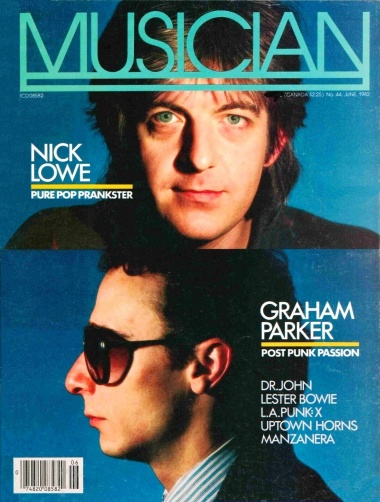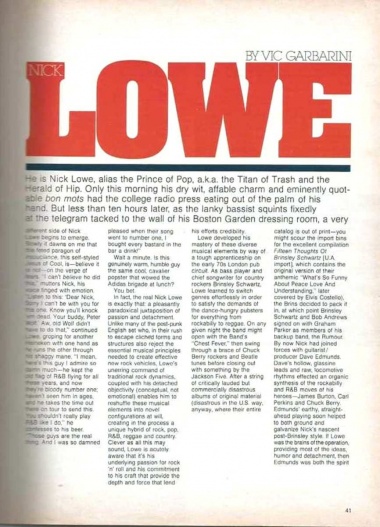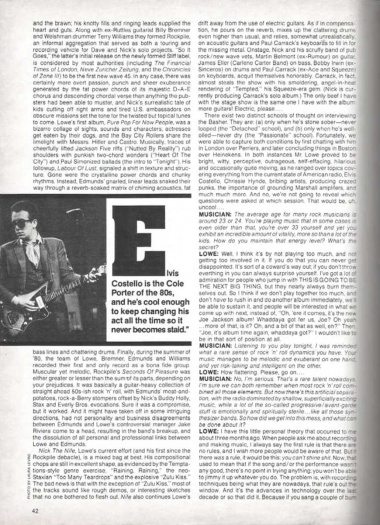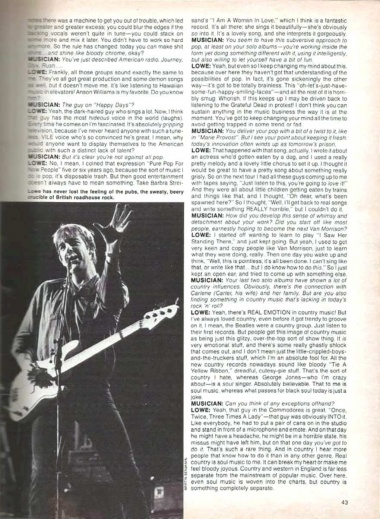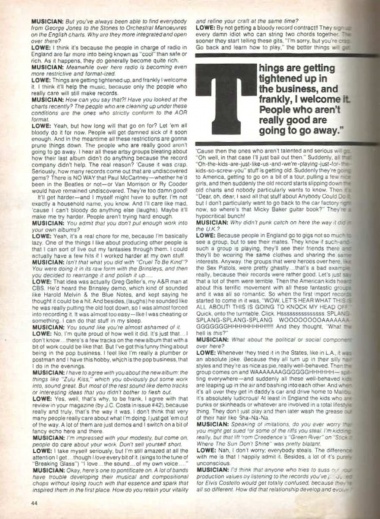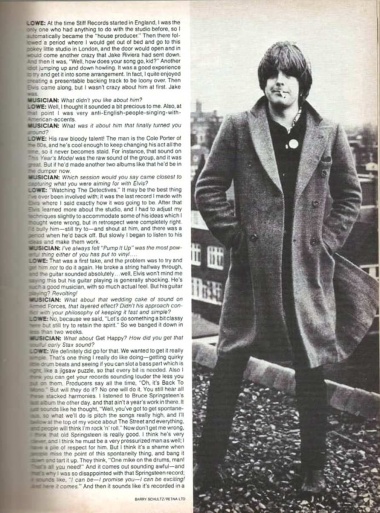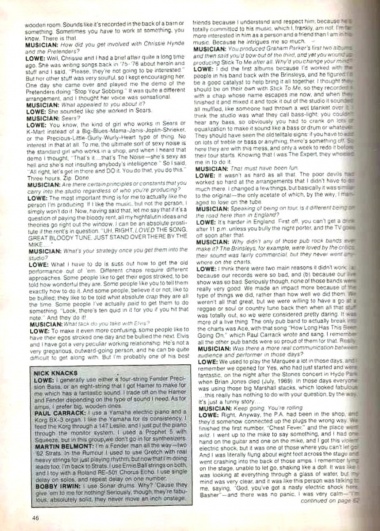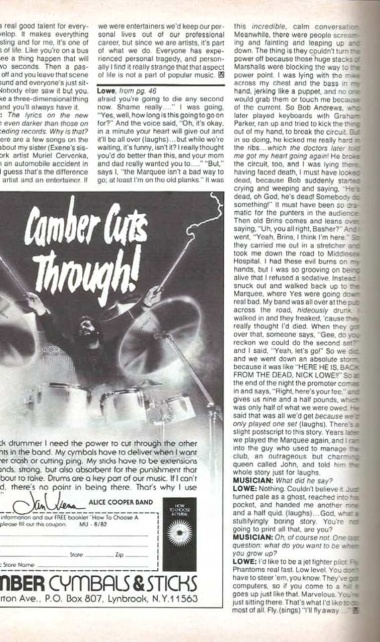|
He is Nick Lowe, alias the Prince of Pop. a.k.a. the Titan of Trash and the Herald of Hip. Only this morning his dry wit, affable charm and eminently quotable bon mots had the college radio press eating out of the palm of his hand. But less than ten hours later, as the lanky bassist squints fixedly at the telegram tacked to the wall of his Boston Garden dressing room, a very different side of Nick Lowe begins to emerge. Slowly it dawns me that the feted paragon of insouciance, this self-styled Jesus of Cool, is – believe it or not – on the verge of tears. “I can’t believe he did this,” mutters Nick, his voice tinged with emotion. “Listen to this: “Dear Nick, Sorry I can’t be with you for this one. Know you’ll knock ‘em dead. Your buddy, Peter Wolf.” Aw, old Wolf didn’t have to do that,” continued Lowe, groping for another Heineken with one hand as he runs the other through his shaggy mane. “I mean here’s this guy I admire so damn much – he kept the old flag of R&B flying for all these years, and now they’re bloody number one; haven’t seen him in ages, and he takes the time out there on tour to send this. You shouldn’t really play R&B like I do,” he confesses to his beer.
“Those guys are the real thing. And I was so damned pleased when their song went to number one. I bought every bastard in the bar a drink!”
Wait a minute, is this genuinely warm, humble guy the same cool, cavalier popster that wowed the Adidas brigade at lunch?
You bet.
In fact, the real Nick Lowe is exactly that: a pleasantly paradoxical juxtaposition of passion and detachment. Unlike many of the post-punk English set who, in their rush to escape cliched forms and structures also reject the essential musical principles needed to create effective new rock vehicles. Lowe’s unerring command of traditional rock dynamics, coupled with his detached objectivity (conceptual, not emotional) enables him to reshuffle these musical elements into novel configurations at will, creating in the process a unique hybrid of rock, pop, R&B, reggae and country. Clever as all this may sound, Lowe is acutely aware that it’s his underlying passion for rock ‘n’ roll and his commitment to his craft that provide the depth and force that lend his efforts credibility.
Lowe developed his mastery of these diverse musical elements by way of a tough apprenticeship on the early 70s London pub circuit. As bass player and chief songwriter for country rockers Brinsley Schwartz, Lowe learned to switch genres effortlessly in order to satisfy the demands of the dance-hungry pubsters for everything from rockabilly to reggae. On any given night the band might open with the Band’s “Chest Fever,” then swing through a brace of Chuck Berry rockers and Beatle tunes before closing out with something by the Jackson Five. After a string of critically lauded but commercially disastrous albums of original material (disastrous in the U.S. way, anyway, where their entire catalog is out of print – you might scour the import bins for the excellent compilation Fifteen Thoughts Of Brinsley Schwartz [U.A. import], which contains the original version of their anthemic “What’s So Funny About Peace Love And Understanding,” later covered by Elvis Costello), the Brins decided to pack it in, at which point Brinsley Schwartz and Bob Andrews signed on with Graham Parker as members of his backup band, the Rumour. By now Nick had joined forces with guitarist / producer Dave Edmunds. Dave’s hollow, glassine leads and raw, locomotive rhythms effected an organic synthesis of the rockabilly and R&B moves of his heroes – James Burton, Carl Perkins and Chuck Berry. Edmunds’ straight-ahead playing soon helped to both ground and galvanize Nick’s nascent post-Brinsley style. If Lowe was the brains of the operation, providing most of the ideas, humor and detachment, then Edmunds was both the spirit and the brawn; his knotty fills and ringing leads supplied the heart and guts. Along with ex-Rutles guitarist Billy Bremner and Welshman drummer Terry Williams they formed Rockpile, an informal aggregation that served as both a touring and recording vehicle for Dave and Nick’s solo projects. “So It Goes” the latter’s initial release on the newly formed Stiff label, is considered by most authorities (including The Financial Times of London, Neue Zuricher Zeitung and the Chronicles of Zone III) to be the first new wave 45. In any case, there was certainly more overt passion, punch and sheer exuberance generated by the fat power chords of its majestic D-A-E chorus and descending chordal verse than anything the pubsted had been able to muster and Nick’s surrealistic tale of kids cutting off right arms and tired U.S. ambassadors on obscure missions set the tone for the twisted but topical tunes to come. Lowe’s first album, Pure Pop For Now People, was a bizarre collage of sights, sounds and characters, actresses getting eaten by their dogs and the Bay City Rollers share the limelight with Messrs. Hitler and Castro. Musically, traces of cheerfully lifted Jackson Five riffs (“Nutted By Reality”) rub shoulders with punkish two-chord wonder (“Heart Of The City”) and Paul Simonized ballads (the intro to “Tonight”). His followup, Labour Of Lust, signaled a shift in texture and structure. Gone were the crystalline power chords and chunky rhythms. Instead, Edmunds’ gnarled, linear leads snaked their way through a reverb-soaked matrix of chiming acoustics, fat bass lines and chattering drums. Finally, during the summer of ’80, the team of Lowe, Bremner, Edmunds and Williams recorded their first and only record as a bone fide group. Muscular yet melodic. Rockpile’s Seconds Of Pleasure was either greater or lesser than the sum of its parts, depending on your prejudices. It was basically a guitar-heavy collection of straight ahead 50s-ish rock ‘n’ roll, with Edmunds’ meat-and-potatoes, rock-a-Berry stompers offset by Nick’s Buddy Holly, Stax and Everly Bros. evocations. Sure it was a compromise, but it worked. And it might have taken off in some intriguing directions, had not personality and business disagreements between Edmunds and Lowe’s controversial manager, Jake Riviera come to a head, resulting in the band’s breakup, and the dissolution of all personal and professional links between Lowe and Edmunds.
Nick The Nife, Lowe’s current effort (and his first since the Rockpile debacle), is a mixed bag at best. His compositional chops are still in excellent shape, as evidenced by the Temptations-style genre exercise. “Raining, Raining,” the neo-Staxian “Too Many Teardrops” and the explosive “Zulu Kiss.” The bad news is that with the exception of “Zulu Kiss,” most of the tracks sound like rough demos, or interesting sketches that no one bothered to flesh out. Nife also continues Lowe’s drift away from the use of electric guitars. As if in compensation, he pours on the reverb, mixes up the clattering drums even higher than usual, and relies, somewhat unrealistically on acoustic guitars and Paul Carrack’s keyboards to fill in for the missing metal. Onstage, Nick and his scruffy band of pub rock / new wave vets, Martin Belmont (ex-Rumour) on guitar, James Eller (Carlene Carter Band) on bass, Bobby Irwin (ex-Sinceros) on drums and Paul Carrack (ex-Ace and Squeeze) on keyboards, acquit themselves honorably. Carrack, in fact, almost steals the show with his smoldering, angel-in-heat rendering of “Tempted,” his Squeeze-era gem. (Nick is currently producing Carrack’s solo album.) The only beef I have with the stage show is the same one I have with the album – more guitars! Electric, please….
There exist two distinct schools of thought on interviewing the Basher. They are: (a) only when he’s stone sober – never looped (the “Detached” school), and (b) only when he’s well-oiled – never dry (the “Passionate” school). Fortunately, we were able to capture both conditions by first chatting with him in London over Perriers, and later concluding things in Boston over Heinekens. In both instances Mr. Lowe proved to be bright, witty, perceptive, outrageous, self-effacing, hilarious and occasionally quite moving, as he ranged over topics covering everything from the current state of American radio, Elvis Costello, Chrissie Hynde, bribing artists, producing crazed punks, the importance of grounding Marshall amplifiers and much, much more. And no, we’re not going to reveal which questions were asked at which session. That would be, uh, uncool….
MUSICIAN: The average age for many rock musicians is around 23 or 24. You’re playing music that in some cases is even older than that, you’re over 33 yourself and yet you exhibit an incredible amount of vitality, more so than a lot of the kids. How do you maintain that energy level? What’s the secret?
LOWE: Well, I think it’s by not playing too much, and not getting too involved in it. If you do that you can never get disappointed. It’s sort of a coward’s way out; if you don’t throw everything in you can always surprise yourself. I’ve got a lot of admiration for people who jump in with This Is Going To Be The Next Big Thing, but they nearly always burn themselves out. So I think if we don’t play together too much and don’t have to rush in and do another album immediately, we’ll be able to sustain it, and people will be interested in what we come up with next, instead of, “Oh, ‘ere it comes, it’s the new Joe Jackson album! Whaddaya got fer us, Joe? Oh yeah … more of that, is it? Oh, and a bit of that as well, eh? Then “Joe, it’s album time again, whaddaya got?” I wouldn’t like to be in that sort of position at all.
MUSICIAN: Listening to you play tonight, I was reminded what a rare sense of rock ‘n’ roll dynamics you have. Your music manages to be melodic and exuberant on one hand and yet risk-taking and intelligent on the other.
LOWE: How flattering. Please, go on….
MUSICIAN: No, I’m serious. That’s a rare talent nowadays. I’m sure we can both remember when most rock n’ roll combined all those elements. But now there’s this artificial separation, with the radio dominated by shallow, superficially exciting music, while a lot of the so-called progressive / avant-garde stuff is emotionally and spiritually sterile…. like all those synthesizer bands. So how did we get into this mess, and what can be done about it?
LOWE: I have this little personal theory that occurred to me about three months ago. When people ask me about recording and making music , I always say the first rule is that there are no rules, and I wish more people would be aware of that. But if there was a rule, it would be this: you can’t shine shit. Now, that used to mean that if the song and / or performance wasn’t any good, there’s no point in trying anything; you won’t be able to jimmy it up whatever you do. The problem is, with recording techniques being what they are nowadays, that rule’s out the window. And it’s the advances in technology over the last decade or so that did it. Because if you sang a couple of bum notes there was a machine to get you out of trouble, which led to greater and greater excess: you could blur the edges if the backing vocals weren’t quite in tune – you could stack on some more and mix it later. You didn’t have to work so hard anymore. So the rule has changed: today you can make shit shine… and shine like bloody chrome, okay?
MUSICIAN: You’ve just described American radio, Journey, Styx, Rush…
LOWE: Frankly, all those groups sound exactly the same to me. They’ve all got great productions and some demon songs as well, but it doesn’t move me, it’s like listening to Hawaiian music in elevators! Anson Williams is my favorite. Do you know him?
MUSICIAN: The guy on “Happy Days”?
LOWE: Yeah, the dark-haired guy who sings a lot. Now, I think that guy has the most hideous voice in the world (laughs). Every time he comes on I’m fascinated. Its’ absolutely gripping television, because I’ve never heard anyone with such a tuneless VILE voice who’s so convinced he’s great. I mean, why would anyone want to display themselves to the American public with such a distinct lack of talent?
MUSICIAN: But it’s clear you’re not against all pop.
LOWE: No, I mean, I coined the expression “Pure Pop For Now People” five or six years ago, because the sort of music I do is pop, it’s disposable trash. But then good entertainment doesn’t always have to mean something. Take Barbra Streisand’s “I Am A Woman In Love,” which I think is a fantastic record. It’s all there: she sings it beautifully – she’s obviously so into it. It’s a lovely song, and she interprets it gorgeously.
MUSICIAN: You seem to have this subversive approach to pop, at least on your solo albums – you’re working inside the form, yet doing something different with it, using it intelligently, but also willing to let yourself have a bit of fun.
LOWE: Yeah, but even so I keep changing my mind about this, because over here they haven’t got that understanding of the possibilities of pop. In fact, it’s gone sickeningly the other way – it’s got to be totally brainless. This ‘oh-let’s-just-have-some-fun-happy-smiling-faces” – and all the rest of it is horribly smug. Whorish. If this keeps up I may be driven back to listening to the Grateful Dead in protest! I don’t think you can sustain anything in the music business the way it is at the moment. You’ve got to keep changing your mind all the time to avoid getting trapped in some trend or fad.
MUSICIAN: You deliver your pop with a bit of a twist to it, like in “Marie Provost”. But I see your point about keeping it fresh; today’s innovation often winds up as tomorrow’s prison.
LOWE: That happened with that song, actually. I wrote it about an actress who’d gotten eaten by a dog, and I used a really pretty melody and a lovely little chorus to set it up. I thought it would be great to have a pretty song about something really grisly. So on the next tour I had all these guys coming up to me with tapes saying “Just listen to this, you’re going to love it!” And they were all about little children getting eaten by trains and things like that and I thought, “Oh dear, what’s been spawned here?” So I thought, “Well, I’ll get back to real songs and write something REALLY horrible,” but I couldn’t do it.
MUSICIAN: How did you develop this sense of whimsy and detachment about your work? Did you start off like most people earnestly hoping to become the next Van Morrison?
LOWE: I started off wanting to learn to play “I Saw Her Standing There,” and just kept going. But yeah, I used to get very keen and copy people like Van Morrison, just to learn what they were doing, really. Then one day you wake up and think, “Well, this is pointless, it’s all been done. I can’t sing like that, or write like that… but I do know how to do this.” So I just kept an open ear, and tried to come up with something else.
MUSICIAN: Your last two solo albums have shown a lot of country influences. Obviously, there’s the connection with Carlene (Carter, his wife) and her family. But are you also finding something in country music that’s lacking in today’s rock ‘n’ roll?
LOWE: Yeah, there’s REAL EMOTION in country music! But I’ve always loved country, even before it got trendy to groove on it. I mean, The Beatles were a country group. Just listen to their first records. But people get this image of country music as being just this glitzy over-the-top sort of show thing. It is very emotional stuff, and there’s some really ghastly shlock that comes out, and I don’t mean just the little-cripped-boys-and-the-truckers stuff, which I’m an absolute fool for. All the new country records nowadays sound like bloody “Tie A Yellow Ribbon,” dreadful, cutesy-pie stuff. That’s the sort of country I hate, whereas George Jones – who I’m crazy about – is a soulful singer. Absolutely unbelievable. That to me is soul music, whereas what passes for black soul today is just a joke.
MUSICIAN: Can you think of any exceptions offhand?
LOWE: Yeah, that guy in the Commodores is great. “Once, Twice, Three Times A Lady” – that guy was obviously INTO it. Like everybody, he had to put a pair of cans on in the studio and stand in front of a microphone and emote. And on that day he might have had a headache, he might be in a horrible state, his missus might have left him, but on that one day you’ve got to do it. That’s such a rare thing. And in country I hear more people that know how to do it than in any other genre. Real country music is soul music to me. It can break my heart or make me feel bloody joyous. Country and western in England is far less separate from the mainstream of popular music. Over here, even soul music is woven into the charts, but country is completely separate.
MUSICIAN: But you’ve always been able to find everybody from George Jones to the Stones to Orchestral Manoeuvres on the English charts. Why are they more integrated and open over there?
LOWE: I think it’s because the people in charge of radio in England are far more into being known as “cool” than safe or rich. As it happens, they do generally become quite rich.
MUSICIAN: Meanwhile over here radio is becoming even more restrictive and format-ized.
LOWE: Things are getting tightened up, and frankly I welcome it. I think it’ll help the music, because only the people who really care will still make records.
MUSICIAN: How can you say that? Have you looked at the charts recently? The people who are cleaning up under these conditions are the ones who strictly conform to the AOR format.
LOWE: Yeah, but how long will that go on for? Let ‘emall bloody do it for now. People will get damned sick of it soon enough. And in the meantime all these restrictions are gonna prune things down. The people who are really good aren’t going to go away. I hear all these artsy groups bleating about how their last album didn’t do anything because the record company didn’t help. The real reason? ‘Cause it was crap. Seriously, how many records come out that are undiscovered gems? There is NO WAY that Paul McCartney -whether he’d been in the Beatles or not – or Van Morrison or Ry Cooder could have remained undiscovered. They’re too damn good!
It’ll get harder – and I myself might have to suffer. I’m not exactly a household name, you know. And I’ll care like mad, ‘cause I can’t bloody do anything else (laughs). Maybe it’ll make me try harder. People aren’t trying hard enough.
MUSICIAN: You admit that you don’t put enough work into your own albums?
LOWE: Yeah, it’s a real chore for me, because I’m basically lazy. One of the things I like about producing other people is that I can sort of live out my fantasies through them. I could actually have a few hits if I worked harder at my own stuff.
MUSICIAN: Isn’t that what you did with “Cruel To Be Kind”? You were doing it in its raw form with the Brinsleys, and then you decided to rearrange it and polish it up…
LOWE: That idea was actually Greg Geller’s, my A&R man at CBS. He’d heard the Brinsley demo, which kind of sounded like Harold Melvin & the Blue Notes, and kept saying he thought it could be a hit. And besides, (laughs) he sounded like he was really putting the old foot down, so I was almost forced into recording it. It was almost too easy – like I was cheating or something. I can do that stuff in my sleep.
MUSICIAN: You sound like you’re almost ashamed of it.
LOWE: No, I’m quite proud of how well it did. It’s just that … I don’t know… there’s a few tracks on the new album that with a bit of work could be like that. But I’ve got this funny thing about being in the pop business. I feel like I’m really a plumber or postman and I have this hobby, which is the pop business, that I do in the evenings.
MUSICIAN: I have to agree with you about the new album: the things like “Zulu Kiss,” which you obviously put some work into, sound great. But most of the rest sound like demo tracks or interesting ideas that you didn’t bother to flesh out.
LOWE: Yes, well, that’s why, to be frank, I agree with that review in your magazine (by J.C. Costa in issue #42), because really and truly, that’s the way it was, I don’t think that very many people really care about what I’m doing. I just get ‘em out of the way. A lot of them are just demos and I switch on a bit of fancy echo here and there.
MUSICIAN: I’m impressed with your modesty, but come on, people do care about your work. Don’t sell yourself short.
LOWE: I take myself seriously, but I’m still amazed at all the attention I get… though I love every bit of it, (sings to the tune of “Breaking Glass”) “I love … the sound .. of my own voice…”
MUSICIAN: Okay, here’s one to pontificate on. A lot of bands have trouble developing their musical and compositional chops without losing touch with that essence and spark that inspired them in the first place. How do you retain your vitality and refine your craft at the same time?
LOWE: By not getting a bloody record contract!! They sign up every damn idiot who could string two chords together. The sooner they start telling these gits: “I’m sorry, but you’re crap. Go back and learn how to play,” the better things will get. ‘Cause then the ones who aren’t talented and serious will go, “Oh well in that case I’ll just bail out then.” Suddenly, all that “Oh-the-kids-are-just-like-us-and-we’re-playing-just-for-the-kids-so-screw-you” stuff is getting old. Suddenly they’re going to America, getting to go on a bit of a tour, pulling a few nice girls, and then suddenly the old record starts slipping down the old charts and nobody particularly wants to know. Then it’s “Dear, oh, dear. I said all that stuff about Anybody Could Do It, but I don’t particularly want to get back to the car factory right now, so where’s that Micky Baker guitar book?” They’re a hypocritical bunch!
MUSICIAN: Why didn’t punk catch on here the way it did in the U.K.?
LOWE: Because people in England go to gigs not so much to see a group, but to see their mates. They know if such-and-such a group is playing, they’ll see their friends there and they’ll be wearing the same clothes and sharing the same interests. Anyway, the groups that were heroes over here, like the Sex Pistols, were pretty ghastly … that’s a bad example really, because their records were rather good. Let’s just say that a lot of them were terrible. Then the American kids heard about this terrific movement with all these fantastic groups and it was all so romantic. So when the first import records started to come in it was, “WOW, LET’S HEAR WHAT THIS IS ALL ABOUT! THIS IS GOING TO KNOCK MY HEAD OFF” Quick, onto the turntable. Click Hssssssssssssssss SPLANG-SPLANG-SPLANG-SPLANG WOOOOOOOOAAAAAAA-GGGGGGGHHHHHHHHH!!!!!! And they thought, “What the hell is this?”
MUSICIAN: What about the political or social component over here?
LOWE: Whenever they tried it in the States, like in L.A., it was an absolute joke. Because they all turn up in their silly hair styles and they’re as nice as pie, really well-behaved. Then the group comes on and WAAAAAAAGGGGGGHHHHHH – spitting everywhere – and suddenly all these well-behaved kids are leaping up in the air and bashing into each other. And when it’s all over they get into daddy’s car and drive home to Malibu. It’s absolutely ludicrous! At least in England the kids who are punks and skinheads or whatever are involved in a total lifestyle thing. They don’t just plan and then later wash the grease out of their hair like Sha-Na-Na.
MUSICIAN: Speaking of imitations, do you ever worry that you might get sued for some of the riffs you steal. I’m kidding really, but that lift from Creedence’s “Green River” on “Stick It Where The Sun Don’t Shine” was pretty blatant.
LOWE: Nah, I don’t worry; everybody steals. The difference with me is that I happily admit it. Besides, a lot of it’s purely unconscious.
MUSICIAN: I’d think that anyone who tries to suss out your production values by listening to the records you’ve produced for Elvis Costello would get totally confused, because they’re all so different. How did that relationship develop and evolve?
Remaining text and scanner-error corrections to come...
|
